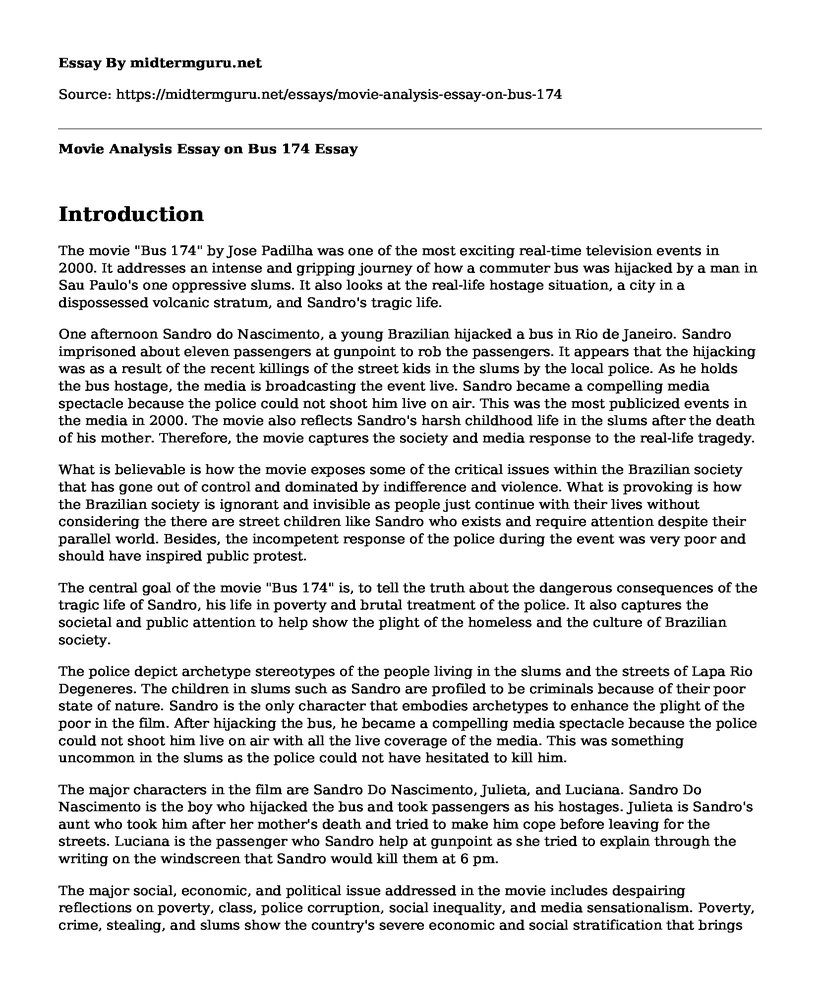Introduction
The movie "Bus 174" by Jose Padilha was one of the most exciting real-time television events in 2000. It addresses an intense and gripping journey of how a commuter bus was hijacked by a man in Sau Paulo's one oppressive slums. It also looks at the real-life hostage situation, a city in a dispossessed volcanic stratum, and Sandro's tragic life.
One afternoon Sandro do Nascimento, a young Brazilian hijacked a bus in Rio de Janeiro. Sandro imprisoned about eleven passengers at gunpoint to rob the passengers. It appears that the hijacking was as a result of the recent killings of the street kids in the slums by the local police. As he holds the bus hostage, the media is broadcasting the event live. Sandro became a compelling media spectacle because the police could not shoot him live on air. This was the most publicized events in the media in 2000. The movie also reflects Sandro's harsh childhood life in the slums after the death of his mother. Therefore, the movie captures the society and media response to the real-life tragedy.
What is believable is how the movie exposes some of the critical issues within the Brazilian society that has gone out of control and dominated by indifference and violence. What is provoking is how the Brazilian society is ignorant and invisible as people just continue with their lives without considering the there are street children like Sandro who exists and require attention despite their parallel world. Besides, the incompetent response of the police during the event was very poor and should have inspired public protest.
The central goal of the movie "Bus 174" is, to tell the truth about the dangerous consequences of the tragic life of Sandro, his life in poverty and brutal treatment of the police. It also captures the societal and public attention to help show the plight of the homeless and the culture of Brazilian society.
The police depict archetype stereotypes of the people living in the slums and the streets of Lapa Rio Degeneres. The children in slums such as Sandro are profiled to be criminals because of their poor state of nature. Sandro is the only character that embodies archetypes to enhance the plight of the poor in the film. After hijacking the bus, he became a compelling media spectacle because the police could not shoot him live on air with all the live coverage of the media. This was something uncommon in the slums as the police could not have hesitated to kill him.
The major characters in the film are Sandro Do Nascimento, Julieta, and Luciana. Sandro Do Nascimento is the boy who hijacked the bus and took passengers as his hostages. Julieta is Sandro's aunt who took him after her mother's death and tried to make him cope before leaving for the streets. Luciana is the passenger who Sandro help at gunpoint as she tried to explain through the writing on the windscreen that Sandro would kill them at 6 pm.
The major social, economic, and political issue addressed in the movie includes despairing reflections on poverty, class, police corruption, social inequality, and media sensationalism. Poverty, crime, stealing, and slums show the country's severe economic and social stratification that brings unendurable tension. The society itself does not pity as it continues to neglect and discriminate the poor especially those living in the streets and slums. The major political issue addressed in the film includes the political hypocrite in the country that leaves children to be killed by the police. Thus, the movie provides an accurate picture of a political, economic, and social indifference for poverty in Rio de Janeiro, Brazil.
Cite this page
Movie Analysis Essay on Bus 174. (2023, Jan 01). Retrieved from https://midtermguru.com/essays/movie-analysis-essay-on-bus-174
If you are the original author of this essay and no longer wish to have it published on the midtermguru.com website, please click below to request its removal:
- Australian and the International Students Drinking Habits
- Essay on Terrorism as an Overall Threat
- Essay on Native American and Ethnic Immigrants
- David Williams Feature - Paper Example
- Sexting, Texting, Cyberbullying and Keeping Youth Safe Online - Article Analysis Essay
- Drug Abuse: An Alarming Global Trend - Essay Sample
- Employment Discrimination Lawsuits: What Businesses Can Do - Essay Sample







